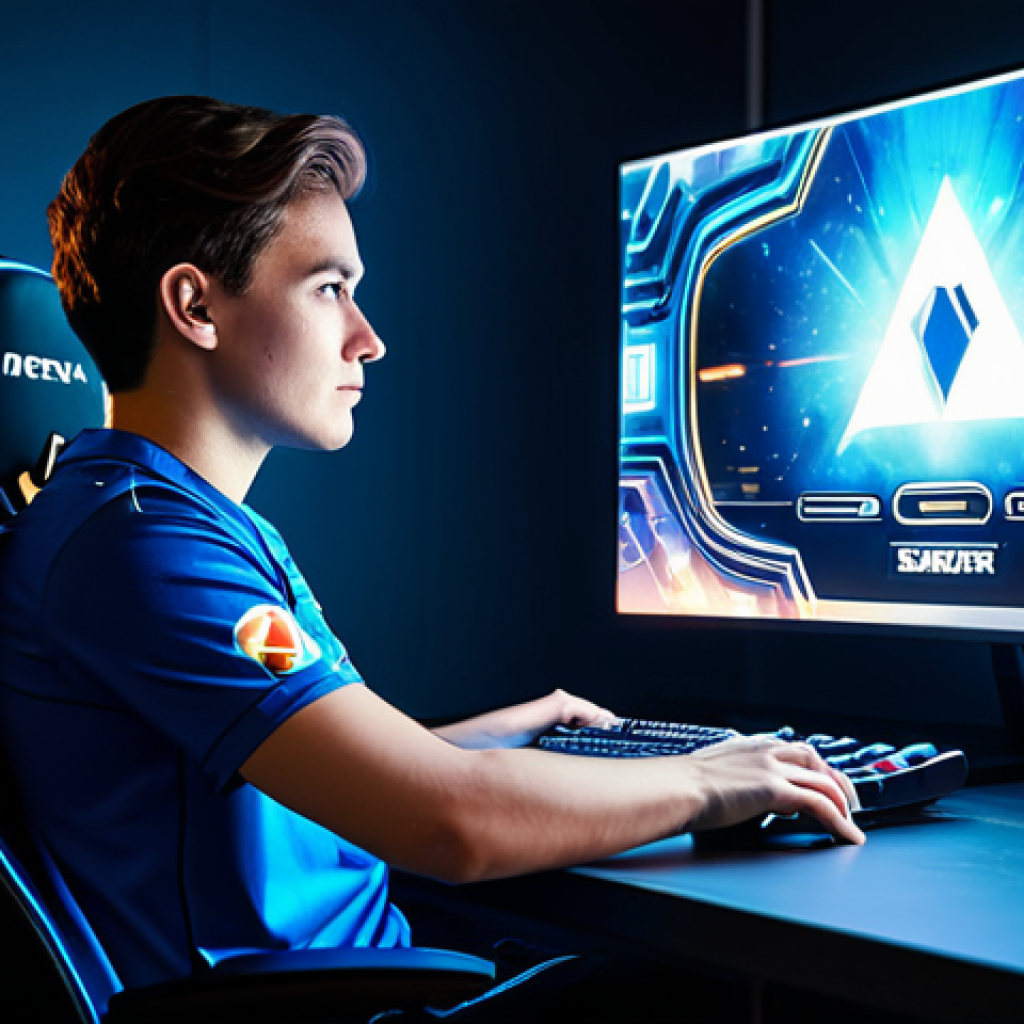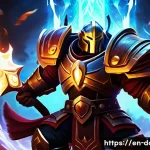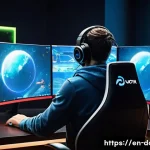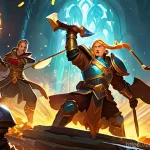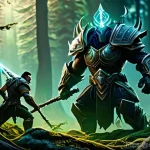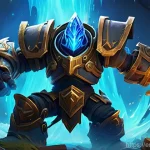Stepping into the vibrant world of Dota 2, it quickly becomes clear that beyond the intense team fights and strategic Roshan attempts, there’s another layer of identity: in-game titles.
I’ve spent countless hours in the trenches, from the humbling beginnings of Herald to the elusive climb towards Divine, and let me tell you, each rank isn’t just a number; it’s a badge of honor, a story of countless late nights and epic comebacks.
We’ve all felt that surge of pride unlocking a new tier, or the bittersweet grind knowing the next one demands even more. But it’s not just about MMR anymore; seasonal event titles, Battle Pass accolades, and even unique achievement badges now paint a richer picture of a player’s journey.
The community thrives on this visual hierarchy, with discussions constantly swirling around the prestige of ‘Immortal’ or the rarity of a specific ‘Aghanim’s Labyrinth’ conqueror title.
As the game evolves, I’ve noticed a clear trend towards even more personalized and dynamic ways to showcase skill and dedication, blurring the lines between raw MMR and unique accomplishments.
It really makes you wonder what unique honors the future might hold, perhaps even titles reflecting specific hero mastery or niche tactical prowess. Let’s dive into the details below.
The journey through Dota 2 has always been about more than just winning or losing; it’s about the stories we accumulate, the challenges we overcome, and the unique ways we get to showcase our dedication.
What began with simple rank badges has blossomed into a complex ecosystem of in-game titles, each one a testament to different facets of a player’s journey.
I’ve personally seen how these titles transform a generic profile into a vivid narrative, reflecting not just raw skill but also perseverance, strategic depth, and even a bit of luck.
It’s a system that truly enhances the feeling of progression, making every game, every event, feel like it contributes to a larger, more personalized identity.
Unveiling the Layers of Player Identity Through Titles
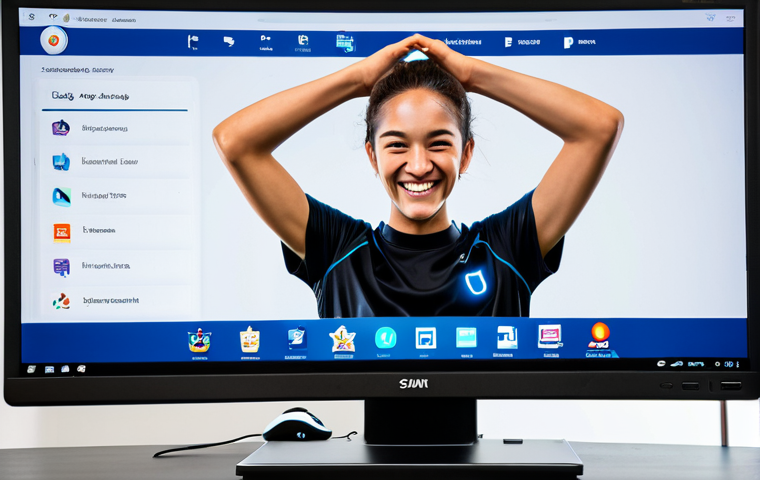
In the vast, ever-evolving landscape of Dota 2, titles have become so much more than mere adornments; they are deeply ingrained markers of a player’s journey, skill, and dedication.
I remember the sheer excitement, almost a primal roar of triumph, when I first clawed my way out of the lower brackets and saw that ‘Crusader’ rank appear.
It wasn’t just a change in icon; it felt like a public declaration of my progress, a visible reward for countless hours spent honing mechanics, learning hero timings, and often, enduring soul-crushing defeats.
This foundational layer, the MMR-based ranks, are the bedrock of our in-game identity. They tell a story of consistent performance, of adapting to the meta, and of grinding through the highs and lows of competitive play.
But beyond these fundamental rankings, the game has introduced a sophisticated tapestry of titles that reflect a far broader spectrum of achievements, from mastering specific game modes to conquering seasonal challenges, offering a richer, more nuanced portrait of who we are as players.
It’s no longer enough to just have a high MMR; the truly compelling profiles are those that showcase a diverse array of these specialized titles, hinting at a player who dives deep into every aspect the game has to offer.
1. The Evolution from Simple Ranks to Complex Accolades
Looking back, the simplicity of just having an MMR number seems almost quaint compared to the rich array of titles we have today. I vividly recall the early days when your rank was practically your entire identity in the game.
It dictated how others perceived your skill, how seriously your calls were taken in pubs, and even how much respect you earned in the drafting phase. There was a raw, almost brutal honesty to it – your MMR was your worth.
However, as the game matured, Valve, to their credit, began to understand that player dedication and skill manifests in countless ways that a single numerical rating just couldn’t capture.
This led to the gradual introduction of specialized titles, which initially felt like minor additions but have since grown into a pivotal aspect of player expression.
It’s truly fascinating to observe how what started as a functional indicator transformed into a system of personal narratives. This expansion allowed players to define themselves not just by their ability to win ranked games, but also by their prowess in unique challenges, their dedication to community events, or their mastery of specific game modes, truly democratizing the concept of in-game prestige.
2. The Psychological Impact of Earning a New Title
There’s an undeniable, almost addictive, psychological payoff when you finally earn a coveted title in Dota 2. It’s more than just an image appearing on your screen; it’s a profound sense of validation, a tangible recognition of effort and improvement.
I remember spending weeks, literally weeks, trying to clear the highest difficulty of a specific seasonal event, failing countless times, feeling that familiar pang of frustration.
But when that final boss fell, and the unique title notification flashed, a wave of pure elation washed over me. It wasn’t just the satisfaction of completion; it was the knowledge that my persistence had paid off, and now I had a unique badge to prove it, a story etched onto my profile.
This psychological reinforcement is crucial because it transforms the often-grueling grind into a rewarding experience, providing incremental goals that keep players engaged and motivated far beyond the immediate objective of winning a single match.
It ties directly into our innate human desire for recognition and achievement, making every title feel like a personal triumph against challenging odds, solidifying our place within the vibrant Dota 2 community.
Beyond the Leaderboard: Showcasing Unique Achievements
While the ladder climb remains a central pillar of the Dota 2 experience for many, the true depth of in-game identity now lies in the myriad of unique titles that exist completely outside of the traditional MMR system.
These aren’t about who has the higher number; they’re about who conquered a specific challenge, who participated in a memorable event, or who demonstrated an exceptional understanding of a particular game mode.
From my perspective, these titles are often far more intriguing because they hint at a player’s diverse interests and specialized talents within the Dota universe.
I’ve often found myself inspecting profiles, not just for their rank, but for those rare, almost mythical titles that speak volumes about a player’s commitment to exploring every nook and cranny of the game.
It’s about the narrative these titles create, showing off a mastery that goes beyond mere combat prowess, reflecting strategic depth, puzzle-solving skills, or even just an unparalleled dedication to completing every single side quest.
These non-ranked titles are the real conversation starters, prompting questions like “How did you get that?” or “That must have been incredibly difficult!” among fellow enthusiasts.
1. Event-Exclusive and Battle Pass Accolades
The seasonal events and Battle Passes have become fertile ground for some of the most coveted and visually striking titles in Dota 2. I’ve spent countless hours, often pulling all-nighters, grinding Battle Pass levels, not just for the cosmetics but for those exclusive titles that disappear forever once the event ends.
There’s a certain cachet to having a title like “Aghanim’s Labyrinth Connoisseur” or “Diretide Champion” because it immediately tells other players that you were there, you participated, and you excelled during a specific, time-limited period.
This exclusivity makes them incredibly desirable. It’s a badge of honor that signifies your presence and dedication during a particular moment in Dota 2 history.
From my personal experience, these titles often feel more rewarding than simply gaining a few MMR points, precisely because they require a different kind of effort – often collaborative, puzzle-solving, or sheer endurance – and their rarity ensures they maintain their prestige long after the event has concluded.
2. Mastery and Challenge-Based Distinctions
Beyond seasonal flair, Dota 2 has also introduced titles that reward specific feats of mastery or overcome particularly arduous challenges. Think about titles granted for reaching a certain hero level on multiple heroes, or completing an incredibly difficult in-game quest line without dying.
These are the titles that truly test your limits, demanding not just skill but deep understanding and often, significant strategic planning. I recall one particular challenge, a hidden achievement that required a very specific sequence of actions across multiple games, and the “Architect of Chaos” title it bestowed felt like the ultimate validation of my game knowledge.
It wasn’t about winning a game; it was about executing a complex, multi-stage objective flawlessly. Such titles transform the game into a grander puzzle, where the reward isn’t just a victory screen but a permanent marker of your cunning and dedication.
They encourage players to experiment, to push boundaries, and to delve into the intricate mechanics of the game in ways that pure ranked play might not always necessitate.
The Prestige Economy: How Titles Influence Perceptions
It’s undeniable that in-game titles have a profound effect on how we perceive ourselves and, more importantly, how others perceive us in the Dota 2 community.
This isn’t just about showing off; it’s about establishing credibility, signaling expertise, and even influencing team dynamics before the first creep wave even meets.
I’ve been in countless pub games where a player with a particularly rare or difficult-to-obtain title instantly commands more respect, often leading to better coordination and a higher chance of victory.
There’s a subconscious assumption that someone who has earned a title like “The Immortal Monarch” (from the highest rank) or “Siltbreaker Conqueror” possesses a deeper understanding of the game or a higher level of skill, irrespective of their current performance in that specific match.
This “prestige economy” is fascinating because it operates almost independently of raw MMR, creating an alternative hierarchy where unique achievements carry significant social currency.
It fosters a sense of aspiration, pushing players not just to win games, but to also seek out and conquer these more esoteric challenges, knowing that the visible badge will elevate their standing within the community.
1. Influencing Team Dynamics and Trust
I’ve personally witnessed how a player’s titles can instantly shift the entire dynamic of a game. Imagine you’re in a ranked match, and someone on your team has the “Aghanim’s Labyrinth Grand Magus” title.
Instantly, there’s an unspoken trust, an assumption that this player is not only skilled but also knowledgeable about specific game mechanics, teamwork, and decision-making under pressure.
I’ve seen these players take charge, make crucial calls, and lead teams to victory, often just by the sheer weight of their perceived authority stemming from their titles.
Conversely, a profile devoid of any unique titles, even if their MMR is decent, might face more scrutiny or doubt. It’s a subtle yet powerful form of non-verbal communication within the game, influencing whether teammates listen to your pings, follow your rotations, or trust your item build choices.
This social capital that titles provide can be incredibly valuable, transforming a chaotic pub game into a cohesive unit simply by establishing instant credibility.
2. The Role of Rarity and Difficulty in Perceived Value
Not all titles are created equal, and their perceived value is directly proportional to their rarity and the difficulty associated with earning them. A common Battle Pass title, while nice, doesn’t carry the same weight as a title earned from winning a highly competitive, limited-time tournament.
From my experience, the titles that truly turn heads are those that required immense dedication, exceptional skill, or a significant time investment. Think about titles from the original Aghanim’s Labyrinth, particularly the highest tiers – those signify that a player has overcome an unbelievably punishing gauntlet of challenges.
The more obscure the method, the more demanding the requirements, the higher the prestige. This intrinsic link between difficulty and perceived value makes these titles highly sought after, acting as aspirational goals that drive players to push their boundaries, knowing that the ultimate reward is a distinctive mark of honor that few others possess.
Crafting a Legacy: Titles as Personal Narratives
Beyond the immediate gratification and social prestige, I’ve come to view in-game titles as building blocks of a player’s personal legacy within Dota 2.
Each one isn’t just a static badge; it’s a chapter in your ongoing story, a tangible representation of your journey through countless patches, metas, and memorable moments.
It’s like looking through an old photo album, but instead of pictures, you see a collection of digital honors that evoke specific memories: the agonizing clutch plays, the collaborative triumphs, the solitary grind to master a new hero.
My own profile, adorned with a mix of high-rank badges and obscure event titles, tells a narrative that’s uniquely mine. It speaks to the late nights spent trying to break through a rank barrier, the exhilaration of conquering a particularly tricky seasonal boss with friends, and the quiet satisfaction of completing a hidden achievement that few even knew existed.
This aspect of personal narrative is, for me, the most compelling reason why titles matter so much; they transform your in-game persona from a generic player into a distinct, memorable character with a rich history of dedication and achievement.
1. Reflecting a Player’s Journey and Dedication
Every title I’ve earned holds a specific memory, a unique story of perseverance and growth. The ‘Immortal’ title speaks of years of consistent effort and strategic refinement.
The ‘Roshan Slayer’ title reminds me of that one game where our team executed a perfect Roshan bait, turning the tide of a seemingly lost battle. These aren’t just statistics; they are vivid recollections of intense moments, of overcoming challenges, and of personal development within the game.
It’s a public diary of your commitment to Dota 2, showcasing the diverse ways you’ve engaged with its ever-expanding universe. This storytelling aspect is incredibly powerful, allowing players to look back at their accomplishments and truly appreciate the path they’ve traversed.
It’s a testament to the dedication required to excel in a game as complex and demanding as Dota 2, turning abstract numbers into tangible, narrative-rich achievements that celebrate individual commitment.
2. Celebrating Niche Expertise and Community Contributions
Sometimes, the most interesting titles aren’t about raw combat skill but about niche expertise or even community involvement. I’ve always admired players who sport titles like “Overthrow Overlord” or “Custom Games Champion,” indicating a deep love for and mastery of specific alternative game modes.
These titles tell me that this player isn’t just focused on ranked MMR; they’re someone who embraces the broader spectrum of Dota 2, contributing to its diverse ecosystem.
Perhaps they even created custom games or contributed to the workshop. Such titles highlight a player’s willingness to step outside the conventional competitive arena and explore, master, and even enrich other aspects of the game.
They celebrate dedication to the entire Dota 2 experience, fostering a more inclusive sense of achievement where even niche passions are recognized and rewarded.
The Future of In-Game Honors: What’s Next?
As Dota 2 continues to evolve, I’ve found myself constantly pondering what the next iteration of in-game honors might look like. The current system is robust, but the beauty of this game is its capacity for endless innovation.
My imagination often drifts to more granular, highly personalized titles that could truly revolutionize how we display our identity. Perhaps titles based on specific hero mastery beyond just general levels, or even ones that reflect tactical prowess like “Perfect Ganker” for consistently high early-game impact, or “Flawless Disabler” for exceptional crowd control execution.
The potential for more dynamic and adaptive titles, reflecting real-time performance metrics or even community contributions outside of direct gameplay, feels like the natural next step.
I’m always keen to see how Valve will surprise us, but one thing is certain: the appetite for unique, meaningful ways to display our journey in Dota 2 isn’t going anywhere.
1. Personalized Titles and Dynamic Display Options
I’ve often daydreamed about a future where titles become even more deeply personalized. Imagine earning a title like “The Phantom Assassin’s Shadow” for achieving an incredibly high number of streaks with the hero, or “Tinker’s Tactical Mastermind” for consistently high building damage and objective control.
This level of granularity would allow players to truly hone in on and display their specific strengths and preferred playstyles, moving beyond general classifications.
Furthermore, dynamic display options could be introduced, allowing players to cycle through their favorite titles, or even combine elements of different titles to create a truly bespoke identity.
It would transform the profile page into a dynamic portfolio of achievements, reflecting a player’s evolving skills and passions in real-time, making every earned title feel even more significant and celebrated.
2. Expanding Honors Beyond Gameplay Metrics
The future of in-game titles could also extend beyond pure gameplay statistics to encompass a broader range of contributions to the Dota 2 ecosystem. What if there were titles for outstanding sportsmanship, like “The Paragon of Positivity,” or for significant contributions to the community, such as “Workshop Artisan” for creators, or “Lore Keeper” for those who delve deep into the game’s rich narrative and share their knowledge?
Such titles would foster a more holistic and positive community environment, recognizing values beyond just raw skill or win rates. It would incentivize players to engage with Dota 2 in more meaningful and diverse ways, celebrating not just the competitive spirit but also collaboration, creativity, and the preservation of the game’s vibrant culture.
| Title Category | Description & Example | Perceived Value & Difficulty | Impact on Player Identity |
|---|---|---|---|
| Ranked MMR Titles | Standard rank badges (e.g., Herald, Guardian, Immortal). Reflects competitive skill and consistent performance. | High (Base); Varies per Tier (Immortal> Herald). | Fundamental identifier, dictates initial perception of skill. |
| Seasonal Event Titles | Exclusive titles earned by completing specific challenges during time-limited events (e.g., “Aghanim’s Labyrinth Connoisseur,” “Diretide Champion”). | High (due to exclusivity and time-limited nature). Often requires unique skills beyond regular ranked play. | Showcases participation in historical events, often indicates diverse game mode mastery. |
| Battle Pass Accolades | Titles unlocked by reaching certain levels or completing specific quests within a Battle Pass (e.g., “The International Collector,” “Cavern Crawl Champion”). | Medium to High (depending on level/quest difficulty). Generally accessible with dedication. | Demonstrates consistent engagement, dedication to seasonal content, and often, financial support. |
| Hero Mastery Titles | Titles for achieving high levels or specific feats with individual heroes (e.g., “Invoker Prodigy,” “Axe’s Berserker”). | High (reflects deep understanding and countless hours on a specific hero). | Signifies specialized expertise, a preferred playstyle, and often, an emotional connection to a hero. |
| Achievement/Quest Titles | Titles for completing specific, often hidden, in-game achievements or complex quest lines (e.g., “Ancient Conqueror,” “Pudge’s Master Butcher”). | Very High (often requires obscure knowledge, specific strategies, or extreme luck/dedication). | Highlights a player’s curiosity, problem-solving skills, and willingness to explore non-obvious game aspects. |
Monetization and Engagement: The Design Philosophy Behind Titles
It’s impossible to discuss in-game titles without acknowledging their strategic role in monetization and player engagement. From a business perspective, titles are ingenious tools for driving player retention and encouraging spending.
I’ve personally felt the pull of a Battle Pass, not just for the cosmetics, but for that elusive final tier title that signifies ultimate dedication. This design philosophy is incredibly effective because it taps into our innate desire for recognition and achievement, transforming cosmetic items and event participation into a tangible, long-lasting mark of prestige.
The entire system is carefully calibrated to enhance dwell time, encourage repeated logins, and provide a continuous stream of aspirational goals, all of which contribute to a healthier in-game economy.
It’s a win-win: players get unique ways to express themselves, and Valve ensures a vibrant, active community that’s invested in the game’s ongoing success.
1. Driving Engagement and Player Retention
From a game designer’s perspective, titles are masterful tools for boosting player engagement. I’ve seen countless friends, and indeed, experienced myself, how the pursuit of a specific title can keep you logging in day after day, even when the ranked grind might feel stale.
They provide a continuous sense of progression and purpose, acting as mini-goals that culminate in a publicly displayable badge of honor. This constant stream of achievable objectives, distinct from just winning matches, helps combat player fatigue and ensures a stable, active player base.
The allure of collecting rare titles keeps the community vibrant and encourages players to explore every facet of the game, from competitive ranked play to niche custom game modes, all contributing to longer average play sessions and higher retention rates.
2. Encouraging Battle Pass Investment and Event Participation
It’s no secret that a significant portion of Dota 2’s revenue comes from Battle Passes and seasonal events. Titles play a crucial role in this ecosystem.
They are often tied to specific tiers or demanding challenges within these passes, providing an additional, non-cosmetic incentive for players to invest their time and money.
I’ve personally purchased Battle Pass levels, not just for the skins, but to secure a particular title that I knew would be rare and prestigious. This strategic placement of desirable titles acts as a powerful motivator, driving purchases and participation.
It creates a sense of urgency and exclusivity, knowing that these titles are only available for a limited time, thereby maximizing the perceived value and encouraging immediate engagement with the content.
This directly contributes to the game’s financial health, allowing for continuous development and new content.
The Social Fabric: Community Perception and Title Signaling
The moment you load into a game of Dota 2, your chosen title sends out an immediate signal to everyone else in your lobby. It’s a subtle but incredibly effective form of social communication, influencing initial perceptions, establishing unspoken hierarchies, and even dictating the tone of a match before the first hero is picked.
From my own experience, seeing a rare or high-tier title instantly changes my expectations of a teammate or opponent. It creates an almost instant mental profile, often leading to either increased respect, a sense of intimidation, or sometimes, even a competitive spark.
This “title signaling” plays a crucial role in the social fabric of the Dota 2 community, allowing players to instantly convey their experience, their dedication, and their specific areas of expertise, all without uttering a single word.
It shapes the initial interactions and expectations, contributing to the rich, dynamic social landscape of the game.
1. Instant Credibility and Respect within Pubs
In the chaotic environment of a public match, where communication can often be limited or strained, a compelling title can be your most powerful ally.
I’ve seen countless instances where a player with a “Divine” rank combined with a “Roshan Conqueror” title instantly gains the trust of their teammates.
Their pings are followed more readily, their suggestions are considered more seriously, and their general authority within the team is elevated. This isn’t just theory; it’s a phenomenon I’ve observed time and again.
Titles grant instant credibility, reducing friction and improving coordination, even among strangers. It’s a shortcut to establishing respect, allowing players to bypass the typical skepticism and immediately contribute to a more cohesive team environment.
2. Titles as Conversation Starters and Community Bonds
Beyond establishing hierarchy, titles also serve as fantastic conversation starters and foster a stronger sense of community. I’ve often initiated conversations with strangers in my games, asking about a particularly rare or intriguing title they were sporting.
“How did you get that ‘Crimson Witness’ title?” or “That ‘Aghanim’s Labyrinth Legend’ must have been brutal!” These questions often lead to shared stories of triumph and frustration, forging temporary bonds and enriching the overall gaming experience.
This shared understanding of the difficulty and significance of certain titles creates a unique camaraderie among players, transforming a simple badge into a topic of common interest and a bridge for social interaction, further cementing the emotional investment players have in the game.
Closing Thoughts
As I reflect on my own extensive journey through Dota 2, it’s clear that in-game titles are far more than just pixels on a screen. They are deeply personal artifacts, weaving together a vibrant tapestry of skill, dedication, and unforgettable moments. Each title represents a story – a challenge overcome, a triumph celebrated, or a unique facet of your playstyle brought to life. They enhance the very fabric of our interaction with the game, making every achievement feel truly significant and contributing to a rich, evolving identity within the vast Dota 2 universe. So, the next time you see a rare title, take a moment; it’s likely a window into a fascinating player legacy.
Useful Information
1. Check Your Titles: You can view all your earned titles by navigating to your in-game profile. They are usually displayed prominently near your MMR and other stats, allowing you to choose which one to showcase.
2. Earning Exclusive Titles: Many of the most coveted titles are earned through participation in seasonal events (like Battle Passes or specific game modes). Always check event details to understand the unlock criteria before they disappear!
3. Showcase Your Persona: Your active title can be changed at any time from your profile. Consider what message you want to send – are you a seasoned veteran, a master of a specific hero, or an event conqueror?
4. Titles vs. MMR: Remember that titles offer a different kind of prestige than raw MMR. While MMR reflects competitive rank, titles often highlight diverse skills, unique achievements, and dedication beyond the ladder.
5. Community Engagement: Don’t hesitate to ask other players about their interesting titles! It’s a great way to learn about hidden achievements, unique events, and connect with fellow enthusiasts who share a passion for Dota 2.
Key Takeaways
In-game titles in Dota 2 are pivotal in shaping player identity, offering a nuanced reflection of skill, experience, and dedication beyond standard MMR. They serve as powerful psychological motivators, driving engagement and encouraging investment in Battle Passes and events. Furthermore, titles profoundly influence social perception within the community, granting instant credibility and fostering meaningful conversations among players. Ultimately, they act as personal narratives, celebrating unique achievements and contributing to a player’s lasting legacy in the game.
Frequently Asked Questions (FAQ) 📖
Q: Beyond the raw MMR, what makes Dota 2’s in-game titles so personally meaningful to players, and why do we chase them?
A: Oh man, it’s so much more than just a number on a screen, isn’t it? I mean, I’ve been there, slogging through countless matches, feeling that gut-wrenching despair after a loss, and then that incredible, almost euphoric surge of pride when you finally, finally unlock that next tier.
It’s not just a rank; it’s a badge of honor forged in late-night grinds and those insane, against-all-odds comebacks. Every tier tells a story – your story.
It’s a testament to the hours you’ve poured in, the strategies you’ve mastered, and even the friendships you’ve made (or nearly lost!) in the heat of battle.
That feeling of hitting Divine, after dreaming about it for what felt like an eternity? Absolutely priceless. It’s the journey, not just the destination, that truly imbues these titles with such personal significance.
Q: It seems like in-game titles are getting more complex than just our rank. How has their scope broadened, and what kind of achievements are now being recognized?
A: You’re spot on! It used to be all about that elusive MMR number, right? But I’ve noticed a really cool shift over the years.
Now, it’s not just about hitting Immortal. The game’s truly evolved to celebrate all sorts of dedication. Think about it: those seasonal event titles you earn, the shiny Battle Pass accolades you grind for, or even those super specific achievement badges from things like Aghanim’s Labyrinth.
They all paint a much richer, more nuanced picture of a player’s journey. It’s like the game is finally saying, ‘Hey, we see you, not just for your wins, but for your commitment to unique challenges and community events.’ It makes showing off your profile way more interesting because it reflects a broader spectrum of your time and skill invested, not just your rank.
Q: How do these evolving in-game titles influence the Dota 2 community, and what do you think the future holds for displaying player accomplishments?
A: Oh, the community absolutely thrives on this stuff! I mean, you can’t scroll through Reddit or hop into a Discord server without seeing discussions swirling around the prestige of ‘Immortal’ or the sheer rarity of someone having, say, that ‘Aghanim’s Labyrinth’ conqueror title from way back.
It creates this really cool visual hierarchy, a sort of shared language for bragging rights. Everyone wants to show off their unique accomplishments, and these titles are the perfect canvas.
Looking ahead, it genuinely makes me excited to wonder what else Valve might cook up. I wouldn’t be surprised if we eventually see titles reflecting specific hero mastery – imagine a ‘Grandmaster Invoker’ title, or even ones for niche tactical prowess, like ‘Flanking Maestro’ for someone who consistently pulls off incredible ganks.
The possibilities are endless, and it feels like we’re just scratching the surface of truly personalized recognition in-game.
📚 References
Wikipedia Encyclopedia
구글 검색 결과
구글 검색 결과
구글 검색 결과
구글 검색 결과
구글 검색 결과
